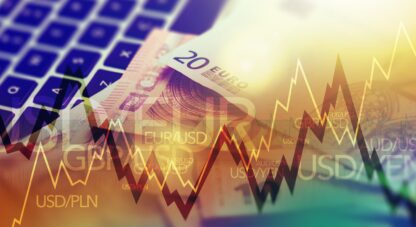Podcast: Play in new window
- U.S. Government 43% Larger In Last 4 Years
- Gaza Attack Brings Temporary (3 Day) Relief To Rising Interest Rates
- Global Antisemitism Rises As Hamas Claims ‘Victim’ Strategy
“There is a re-gearing of narrative and there’s a focusing in on what needs to become the belief system that carries us into 2024. And it’s unfortunate but somewhat predictable that an economist with a particular political leaning is going to see the world in a particular way. So the lens that you see the world through, okay, there’s your interpretation, there’s your prescription in terms of policies.” –David McAlvany
Kevin: Welcome to the McAlvany Weekly Commentary. I’m Kevin Orrick, along with David McAlvany.
David, it’s been a long week. We’ve been very heavy with what’s been going on over in the Middle East, and I know you had particular stakes in this because your wife was giving a presentation at a meeting in Turkey, in Istanbul, and your eldest son was with her. Fortunately they got back last night at what? 2:00?
David: 2:00 AM, yeah. Yeah, it’s been an interesting two weeks, not only with their absence from the house, but a good friend of ours, a family friend, their son just turned 18 and has been working on a kibbutz in Israel and was fortunate to get a last seat on a plane out on Emirates Airlines last Tuesday. And I found myself having brisket and a meal with the whole family over the weekend, and it’s really a fascinating thing, just the context there and the problems still to be solved.
Kevin: Well, and I want to talk about that a little bit later. I do know this. We watched a couple of football games this weekend. Fortunately, we live in a land where I can peacefully say, yeah, we can still watch sports. But each game they stopped and had a moment of silence for what they called the massacre, which we need to make sure that we understand that this is a massacre. This is not just normal tit-for-tat war. This was a massacre. But before we go there, Dave, I’d like to talk about economics because they are affected by geopolitics. So let’s jump into that and then maybe talk about Israel and Hamas and what’s going on there later.
David: Absolutely. You get gold to move $61 in a very short period of time. You get oil volatility, you get safe haven buying in Treasurys. A lot of volatility this last week and very significant things happening, particularly in the Treasury market. Love to talk about Bloomberg contributor John Authers in his recent post, “Lead Us Not Into Inflation.”
Kevin: Boy, that’s—
David: But deliver us from evil. Lead us not into inflation. He noted that we had a disappointment with both the headline and core consumer price index readings this last week. So coming in higher than economists expected. You also had PPI, so the wholesale version—
Kevin: Producer Price [Index], yeah.
David: Marked the third increase in a row, but the bond market took those measures relatively in stride. It was the 30-year bond auction on Thursday that raised more concerns.
Kevin: Yeah, what happened there? Because the bonds actually were getting some of that gain that you would have when there’s flight capital. That went away on Thursday.
David: That’s exactly right. So following what happened with Hamas and Israel, of course you had the sort of bond market rally and yields coming down, prices going up, people clamoring for a little bit more safety throughout the week. And then towards the end of the week, there is this question, is there such a thing as too much supply in a world of limitless credit creation? And it would seem that the global bond market is concerned not just with Treasurys, again, this is global, but with excess modern money creation. Keep in mind, modern money is not just what you get from the printing presses, but it’s the ones and zeros that can be digitally created IOUs, in the form of IOUs, regardless of the geography. So Authers shows a chart of the inflation pieces, the contributing factors. He gets this from Bloomberg. Services, which includes housing, led the increase in the first quarter going back to 2021, and it’s been on the rise, stubbornly now.
It’s four to five times what it was, 2023 versus 2021. So big increase from then to the present time. Energy was a negative or a deflationary component through most of 2019 and 2020. Of course we had, at one point during 2020, a negative oil price for WTI, West Texas Intermediate, because of what could not be delivered in Oklahoma. There was no room, and then shifted into higher gear, this is the oil price in 2021. So you look at this chart and you can see it shifting into higher gear in 2021, then we get a little bit of reprieve, right? So this is the narrative, inflation’s coming down. It actually went negative in terms of the energy component from March to August of 2023. Obviously oil and fuel costs are higher by 20 or 30% since summer. But tellingly, that increase has yet to be factored in. It’s kind of a lagged impact—
Kevin: So lead us not into inflation, but deliver us. How do we get delivered? Yeah.
David: It’s a little too late for that. Well, the Atlanta Fed keeps a measure of sticky inflation, and the parts that they’re looking at don’t change quickly. So they strip out food and fuel. They do still have the housing component in there, and it’s at over 5%, 5.07%. Eggs, they are off the inflationary boil, but in the inflation numbers, they’re helping actually contribute to a negative side of that. With my wife traveling in the last few weeks, I’ve had the opportunity to shop for groceries a little bit more often. Natural Grocers, they’ve got their cage-free natural eggs, which last time I was in there, was a buck 99. If you want extra large or if you care to subsidize the chicken’s extra ground for roaming, the cage-free variety, you can always pay more, up to 7.99 a dozen, but maybe I’m a little cheap. And so I looked for the cheapest eggs, buck 99, now they’re 3.50—again up from a buck 99. Statisticians derive negative inputs from positive numbers and how they do that, it’s kind of the stuff of miracles.
Kevin: It is miracles where they can say, “Hey, inflation, oh, no, no. The increase in inflation is dropping.” Remember in Princess Bride, he was only mostly dead, right? There are things that just don’t make sense, but a lot of times these inflation indexes strip the things out that we actually use.
David: One measure less than miraculous is the supercore. The supercore strips out services, including shelter, and gives a cleaner read on one particular thing. And I think this was really key for this last week’s number. It helps focus in on wage inflation. September was the highest reading month-on-month since last September’s read, and it was arguably higher last September coming out of Covid. And so that’s a concern, that we now have this resurgence in wage inflation showing up, because there is no Covid influence here, just pure and simple wage inflation.
Kevin: And Dave, wage inflation doesn’t go backwards. How often do you call somebody in the office and say, “Hey, you know that raise I gave you last year?”
David: “Congratulations, I’m taking it back.” No, if you consider the upswing in the volatile energy component, okay, more inflation is coming. You can expect it over the next few months. Housing, okay, it’s held its ground. It’s very high ground, but we suspect that the current, what is it now, 7.63% on your 30-year fixed rate mortgage—
Kevin: Getting up there.
David: That will ultimately have a negative effect in 2024 on the housing component. And of course it’s owners’ equivalent rent, and it’s kind of a funky calculation, but there’s going to be some downside surprise in residential real estate as the 7.63 takes a bite out of the enthusiasm in the real estate market. Super core would certainly support the case that you’re moving towards a classic wage price spiral. Maybe we’re already in gear there. And it’s amazing to listen to a number of the Fed folks because some of them, you can tell they’re definitely hawks, and they think one more lift in interest rates that’ll be necessary. And then you’ve got the mellowest quietest doves. I think the Philly Fed President Harker is one of those.
And he’s already talking about disinflation being underway, disinflation being underway, even though last week we had positive surprises on all of the CPI, PPI, core readings, supercore readings. I mean, everything was higher, and Harker somehow discerns from the market—again it’s a unique form of discernment—but discerns from the market that disinflation is underway with the labor markets coming into better balance. And I don’t know what he’s looking at, maybe it’s a question of what he’s ignoring more than what he’s observing. But you’ve got two guys, Harker’s an employee of the Fed. Krugman, God forbid, God forbid he ever be an employee of the Fed.
But they do seem sort of birds of a feather, claiming that inflation is over. And to be fair to Krugman, inflation is over if you exclude food, gas, rent, anything else that matters. You could almost confuse economists these days for standup comedians. The reality is that there is a re-gearing of narrative and there’s a focusing in on what needs to become the belief system that carries us into 2024. And it’s unfortunate but somewhat predictable that an economist with a particular political leaning is going to see the world in a particular way. So the lens that you see the world through, okay, there’s your interpretation, there’s your prescription in terms of policies, and so you’re going to see, frankly, much more dovish behavior from those who are supportive of Biden. Why? Because we need a little bit more grease in the gears coming into 2024. The economy needs to be humming along, and anything that we can do to make that happen is great. And of course, raising interest rates is the opposite of that. It sort of slows the gearing down and that’s detrimental. That’s detrimental to any politician, either side of the aisle. But if you’re in the dominant party, you’ll pay at the higher price.
Kevin: Well, and I would almost hope that it’s politics that make them ignore all the numbers because that would at least be a reasonable explanation, Dave. There’s a book that I’ve read several times by a guy named Joshua Slocum. He had a little sailboat back a hundred and some odd years ago and became the first man to sail alone around the world. And of course, the way he navigated is the way everybody had to navigate before GPS. He had a sextant and he measured the stars. And you have to use spherical trigonometry to figure out where you’re at. It involves a circle.
And I remember the story, when he stopped in South Africa and the leader there, Kruger, was a flat earth believer. He really truly believed in flat earth, but he also wanted to have Joshua Slocum over, who was a man who was sailing alone around the world. Yet they got into an argument because the leader of South Africa would not admit that the world was round.
Krugman sounds a little bit like Kruger. If it’s political, then there’s an explanation. But if he just really sees the world as flat, talking to a man who’s actually sailing around the world alone—
David: But it’s worth remembering that the Krugerrand, one of the most popular gold coins in the world, is named after this famous South African leader who was also a believer in the flat earth.
Kevin: He felt that his religious beliefs absolutely insisted on it.
Okay, but let’s go back to last week because there was flight capital coming out, and it’s interesting, being around gold now for most of my adult life as far as the business, you do have these periods of time where you have geopolitical tension rise, and gold rises with it. Same thing, however, with the bond market. The bond market, people flee to, or at least have in the past, they flee to US Treasurys when they’re worried about other types of investments during a geopolitical event.
David: I think if you look at the history of the metals, you see some of the most intriguing moves happen when you get a confluence of factors. So think about the economy, think about our debt markets. Think about the fact that market practitioners are just now beginning to pay attention to the implications of 33½ trillion dollars in debt. The implications of $2 trillion in debt being added just since June 2nd this year, the implications of a $2 trillion budget deficit this year, half of which is coming from interest on the national debt, and as we roll over 55% of existing debt over the next 36 months. All of a sudden we’re talking about recalibrating the average interest cost from what was, just a year and a half ago, 1.56% to closer to 4%, implying that we have interest costs that will exceed one and a quarter to one and a half trillion dollars—in excess of 25 to 30% of all tax revenue.
So it’s the confluence of the economic realities meeting up against a geopolitical hardship. And you can look at the most volatile commodities markets, and it has both of them in play. You can have volatility with just a strange economic backdrop affecting supply and demand, whether it’s for oil or for gas or for soft commodities, industrial commodities, gold. But when you bring those two things together and the confluence of geopolitical and financial economic factors get mixed together, then it gets supercharged. And I think that’s what we’re talking about is a supercharged market. The 10-year Treasury and the global bond market, they found relief when they reopened on Monday, October 9th. So the events of October 7th, the catastrophe there, the massacre— Two days later, the bond market opens, and there’s relief within the bond market. And it’s funny, isn’t it, because you’ve got global markets choking on an oversupply of debt, and it takes a geopolitical disaster and war to bring peace and calm to the bond markets.
Kevin: Yeah, but how long did that last? I mean, the safe haven buying, it lasted three days.
David: Haven buying added to the synchronized move lower, that’s the global bond market delivering lower yields, higher prices for a change. Because frankly, the last few weeks, there’s been sort of an intensification, marching towards the edge, if you will. The 10-year was, let’s call it 4.75, 4.8%, and it drops throughout the week to 4½ percent by the time the CPI data is released four days later. And it’s inspiring the equity markets, inspiring risk-takers everywhere, bullish traders everywhere, lower rates, lower rates, even just 20, 30 basis points. It’s like running at sea level. It feels great. You just got access to that much more oxygen. Higher rates are like higher altitude. They make breathing a bit harder, and that describes everybody on leverage. So higher rates, if you’re on leverage, all of a sudden it’s harder to get by.
Between the CPI data and the Treasury auction debacle on Thursday, bonds have nearly returned to their pre-Hamas terror attack levels, and the financial markets are under pressure as a result. Just let this sink in. We had the safe haven buying, and that was completely reversed by the time we get to the end of the Treasury auction, where you’ve got the bond market asking a really good question, how are we going to deal with the oversupply of Treasury debt? We’re not being adequately compensated here. The prices on offer, the yields that are being presented here, are not compelling. So you end up with an oversupply and what is to one degree or another, a failed auction last Thursday. Pretty, pretty important.
Kevin: But it’s hard to discourage guys who really want to buy stocks. If they’re bullish, they’re bullish, period.
David: Yeah. So you ignore the bad news from CPI because after all, CPI and all this inflation garbage is transitory. That’s what’s become a strongly ingrained belief amongst your equity traders. The Treasury auction did disturb the equity jocks, and a key narrative I think has just switched. Equity traders chose, up to last Thursday, to see rising rates as a sign of a stronger economy. Equities rationalized away the increase in interest costs. Things are getting better.
Thursday of last week, Thursday of last week, to quote John Authers, “Was damaging for stock investors because it demonstrated that there were limits on how much the geopolitical situation would drive investors into the shelter of bonds.” If yields won’t stay down in conditions like these, it looks like equity investors will have to deal with a rougher and tighter financial environment for a while. So you’ve got one JPMorgan manager who commented, rates have repriced and now risk assets will need to adjust to the rate move. In essence, we’re moving towards a period of consequences.
Jamie Dimon warns that it’s the most dangerous time in decades. In addition to geopolitical concerns, he was looking at the country’s mounting 33½ trillion dollars debt. It’s the largest peacetime fiscal deficit ever. And it’s a cause for concern. I’m just curious, why wasn’t he concerned in June when it was 31 and change? Something has happened where we’ve gone beyond a number, and maybe it’s the rate of accumulation, maybe it’s the rate of change, or maybe it’s just the fact that in real time you’re getting evidence that the bond market is saying no—not only no, but hell no. And that’s when you have a failed auction, that’s what is communicated. It’s not working anymore. It’s not on terms that are sufficient for us anymore.
Kevin: So “I’ll gladly pay you Tuesday for money that you give me today”—that doesn’t work anymore. But let’s go back to what goes up when geopolitical tension goes up. It’s usually gold. It’s usually the value of the dollar. And I’m wondering also if it’s not going to be oil and energy. If you think of those three things, and Morgan just gave us our briefing before we came in here, and he just went back and he said, look at 1973. Oil up 280% in 17 weeks during the embargo. ’79, of course that was when the Iranian hostage crisis occurred. Oil was up 42% in 22 weeks. 1990, the Iraqi war, up 93% in 10 weeks. Iraq too, in the early two thousands, it was up 50% in 16 weeks. When Ukraine occurred, oil went up 38% in a matter of, I think, three weeks. Hamas, it’s already up 5% in a matter of one week. So the question would be, what happens to energy here and does that have any influence on the dollar?
David: Yeah, it’s an interesting connection. And just to bring balance to the negativity introduced on bonds, there is a reason to perhaps see strength in the dollar. Just as a thought experiment, consider this. The US energy sector has been transformative. We were net importers up until 2017. Now we are a net exporter and our terms of trade have improved, they’ve increased, and our currency gets some support from that. So while reciprocally tightening the screws on the importers of oil, so you think of China, Japan, South Korea, folks that don’t have energy self-sufficiency and must import, this has been a tough period of time for them. It’s actually been a very good time for us. Energy prices have risen since June, and the dollar has appreciated in the same timeframe. And I would extend the analysis beyond energy because there’s been other factors that have sort of boosted the dollar. I just point out the yen and the RMB are peering into a currency abyss, and that too has bolstered the dollar.
But US dollar weakness has been something that, you kind of assume that will be the case if you have significant debt problems or a repudiation of our system of debt, loss of confidence, so to say. And maybe, but maybe not. Rebecca Patterson, who was formerly Chief Investment Strategist with Bridgewater, suggests this is a part of the change in character between oil and the dollar. And no longer is there an inverse correlation between the two. So we’re selling oil, we’re selling natural gas, we’re exporting just an enormous amount of LNG, and that is helpful, particularly as long as global demand remains high. The question Rebecca asks is, in the case of global recession where you don’t see the demand for our product, the exports, our energy exports as robust, what does that do to the dollar?
And there’s this interesting juxtaposition where if we go into a global recession, does that represent a support for the US Treasury market as you see an influx of buying, that has been the tradition so that when there’s pressure in the global economy, people move towards the top of the heap, so to say, that they move towards quality, away from garbage and towards quality. And that has supported the US dollar as the rest of the world has come under pressure.
Kevin: I’ve got a question though. You’re talking about a move to quality. The dollar was quality when it was a gold-backed currency. The dollar was even quality when we had $1 trillion in debt. The dollar maybe was quality going all the way back to the early 2000s when the Iraqi war was breaking out again. Maybe even the dollar was quality during Ukraine, but the government has increased in four years. It’s 43% bigger than it was. Now, that’s fat. That’s not muscle, right? That’s debt fat. It’s 43% bigger than it was in the last four years. When does the dollar stop being quality? When do people stop running to the dollar when they get scared?
David: Yeah, because quality was gold-backed, and then quality was Fed backed. Again, just for the reputation of the best and brightest. And arguably, it’s now no backed. The Fed reputation has been tarnished. Gold is anachronistic. It’s a part of our historical narrative, but it’s certainly not a part of the present reality, fiscal picture or monetary picture. So it’s just an interesting question that Rebecca asks because there’s a possibility that the dollar has support in either the best of times or the worst of times. But as you point out, maybe what’s different this time is the way people perceive the US Treasury or even perceive the US. Patterson’s FT article is worth considering. Again, so there’s this potential positive argument for the US dollar.
We were at the Grant’s conference a week ago, and one of the conference speakers, Bank of America Chief Investment Strategist Michael Hartnett, and he shows a chart of the US equity markets, the capitalization of all US equities versus every other market globally. And he said everyone’s fully invested in US exceptionalism. A bond investor is overweight US Treasurys, an equity investor is massively long US stocks, massively long US tech stocks, and everyone is now overweight the dollar.
I just wonder if this is the thing that we’re going to get wrong. You can only sell what you own, and everyone owns America. So the counterpoint to energy being a US dollar ballast is that the asset markets in the US are over-owned globally. And while that has helped elevate household net worth, helped buoy the dollar, there is a hot money scenario where outflows are doubly disruptive to the financial markets and to the currency, which is I think Hartnett’s point.
Kevin: Something that Morgan brought up. He was talking about the Wall Street Journal and the Financial Times, and articles this last few days have actually sounded more like— As he was reading quotes from the articles, Dave, it sounded like your dad’s newsletter, the McAlvany Intelligence Advisor, and your dad wasn’t wrong, he just was early. And now you’ve got the Wall Street Journal saying “the Treasury has always been the place that people have run, but now the Treasury itself is the source of risk.” That’s a quote from the Wall Street Journal.
David: Yeah. It is interesting to find fairly candid commentary on the structure of the financial markets, the debt markets. Again, even Dimon’s comment on the most dangerous time in decades. And he’s talking about our balance sheet. Yes, it’s in a larger context and so there’s some emotion added when you bring in the Israel and Hamas conflict.
Kevin: Yeah. Well, and when you talk about the Israel-Hamas conflict, it really was a massacre. And so to paint it any other way, I remember when I was in Israel, and I know you, when you were in Israel, there are some very fine people who are Palestinians who are not necessarily the Jews in Israel, but they don’t support what occurred with Hamas.
David: Yeah. Yesterday I was walking through the office and I thought there was a stack of gold on Rob’s desk, and it wasn’t, it was just a whole crate of Ferrero Rocher candies, and it’s these chocolates with a hazelnut inside. And I walked in and I was really excited, now I’m even more excited. I remembered back to the first time I had a Ferrero Rocher. I was sitting with a Palestinian man in a hotel in Jerusalem. We had a fascinating conversation. He was bouncing around all over the world, and most recently spent five, six years living in Australia. Goodhearted. Generous. In fact, he shared with me the conversation and a hazelnut.
Kevin: And a hazelnut.
David: As we described last week, the tone of disapproval over Israeli handling of the Hamas conflict, it has intensified.
Kevin: That’s predictable, isn’t it?
David: Yeah. That was to be expected. Resolving the Hamas terrorist problem will only get harder with time because many view this as a Palestinian issue. I don’t think this is a Palestinian problem. I think it’s a Hamas terror problem. Go back in time, one election, one and only one time, by the way. So you’ve got an election, so we must have a democracy. BS. That’s 2006. There hasn’t been an election since 2006. And after the 2006 election, which put Hamas in power, you had the subsequent military defeat of Fatah in 2007. Again, that’s the complete ousting of the Palestinian authority, left Hamas in control of Gaza in the West Bank. Who are they? Rooted in grievance and religiously inspired to hate Israel. Violence has been a defining characteristic of Hamas since its inception in the ’80s.
Kevin: And how about the hostages? Do you think they’ll ever release the hostages?
David: No. You’re talking about keeping Israeli children as human shields. You’re talking about Hamas keeping their own Palestinian people, restricting their flow to the south to get out of harm’s way, specifically so that they can maintain human shields and thus flog, flog the PR machine, which is, we are victims. So all Hamas are Palestinian, but not all Palestinians are Hamas. Only about half of the Palestinian population, maybe a little bit more than that, close to 60%, supports Hamas as an Islamist military movement. Why does Hamas get so little support from the rest of the world? Have you ever thought about that?
Kevin: Yeah.
David: Have you ever thought about that? I mean, this would be like an enclave of Irishmen who is completely ignored by everyone in Ireland and is not welcome in any Irish pub anywhere in the world. What’s wrong with that enclave? What did they do? But that is the case. Hamas, it’s not supported by the rest of the Arab world.
Kevin: The way the mainstream media is going to play this, do you think it’s going to paint that picture or do you think it’s going to be used to just increase global antisemitism?
David: Well, that’s the reality. What you have is a Palestinian version of the Muslim Brotherhood, and I think a part of the reason why the Arab world is not interested in embracing them is because they’re seen as a destabilizer of the status quo, usurper of the state, or of monarchical power. And keep in mind that anyone who has accepted this view that you can be Muslim and a part of a state or a part of a monarchy, you are operating in opposition to the Quran where there is no such thing. Those are the constructs of man, and it is the caliphate which is the construct of God.
So you go to Jordan, well, okay, there you have it. They want to protect the status quo. They slam the door shot. No immigration. Egypt, incredibly cautious when opening the floodgates of immigration. It’s not just the issue of sorting out radical ideology and peaceable intent. There’s fiscal concerns. Nobody wants to inherit the cost, but there is also a defense of the status quo, which, again, Arabs like the power that they have and don’t necessarily want to cede power to a larger caliphate.
So they may hate the way the world was divided up by the British, particularly the Middle East, but they certainly don’t want to let go of the fringe benefits. So you’ve got women, you’ve got children, you’ve got elderly hostages taken for the first time, by the way, and this is I think really significant. It signals that Hamas has entered a new age of conflict where we don’t know what the limits are. And that’s the way the IDF has to approach this. Prior to October 7th, hostages were male and they were over the age of 18. Not anymore.
Kevin: Now it’s women, children, old, young.
David: We’re talking about rape, beheadings of adults and children, even babies. And this seems to be passed over by many in the media in favor of the growing humanitarian crisis of which Israel is framed as the perpetrator.
Kevin: Yeah, that’s that antisemitism we’re talking about. And this is why you still have to maintain that it’s a massacre.
David: Right. So Hamas will not consider releasing hostages. In fact, there’s just not a lot of discussion about that being sort of a relief valve. Bring this into the conversation, put it on the table. No. News agencies are targeting the siege as the problem and not the consequence of or the response to barbaric behavior. And by the way, when you’re taking your time before you have a sort of ground incursion and you’re dropping leaflets on the public saying you need to leave, you need leave now.
Kevin: Which is what Israel did.
David: They’re doing it daily. And your Hamas leadership won’t let you travel south, actually creating road barriers so that you can stay, I don’t know.
Kevin: It’s like trapping people in a burning theater and then blaming somebody else.
David: Well, as more time goes on, you’re right. Global antisemitism will unfortunately increase. I’ve yet to read journalists or prominent political figures discussing the release of hostages as a means of accelerating peace or ending the siege. Of course, Hamas has been silent on the possibility of giving up their human shields. Global media again seems to favor the Hamas as victim and Israel as colonizer narrative, which on that front, every once in a while, there’s just a brief moment of sanity in an insane world. On the Stanford campus, yeah, it’s insane. On most college campuses today, it’s insane. The sheer volume of brainwashing and BS that gets passed off as quality higher education— It was nice to see—and maybe they had to because the optics on this are terrible—but it was nice to see Stanford suspend a professor, Ameer Hasan Loggins, for rounding up all the Jewish students in his class, putting them in a corner, shaming them as colonizers.
So you’ve got a Stanford prof who’s a vocal supporter of Hamas, but Ameer is emblematic of what Ivy Leagues have become, whether it’s Harvard, Yale, Princeton, Stanford. To some degree, you could say these venerable institutions themselves have been radicalized.
Kevin: The thing too, though, Dave, what we saw last week with Hamas, there was more in the plan. I mean, these guys have planned a whole lot more than even what we saw happen last week.
David: To be fair, I’m generally critical of the news media, NBC did report on documents that it obtained showing Hamas’s other plans to attack. And this is mind-boggling, but consider who we’re talking about. These are plans to attack elementary schools in a youth center in the Kfar Sa’ad kibbutz. Additional plans to seize hostages and bring them back to Gaza. We’re talking about children, elementary school, youth center, atrocities and plans for more than what we witnessed on the seventh.
Kevin: It’s amazing how a person can try to claim to be a victim. I was talking about football, and I know we’re talking about something much more serious, but one of the players just outright shoved another guy, knocked him off his feet. He didn’t see it coming at all. It was between plays. And then he immediately threw up his hands as if he was the victim in the whole thing. And see, I think that’s part of the strategy, too, isn’t it? To make sure that the world portrays Hamas as a victim.
David: I remember years ago I was changing my son’s diaper, and another child, about age five, walked over and almost bit my son’s finger off. I’m busy, because if you’re not careful—
Kevin: Just came over and— Yeah.
David: And I looked down and he’s locked in, and it’s to the bone. To my surprise, that boy’s father scoops him up into his arms, hugs him, and asks if he’s all right, even while my baby boy’s wailing in pain. And I’m like, what is wrong with this picture?
Kevin: Victimization. There you go. Who’s the real victim?
David: And yet that’s how I see things playing out in the media. It’s like, “Oh, we need to be supportive of Hamas here because don’t you know—” Well, I mean, Israel’s dropping leaflets in the north of Gaza. They’re encouraging the Palestinian population to move south to get out of harm’s way. Hamas has set up roadblocks preventing evacuation from the danger zone. Just let your mind wrap around that. Hamas has no regard for anyone, including their own people, who they willingly use as human shields. So Israel’s painted as the aggressor, Hamas the victim. You had one embedded journalist who said—I thought this was a very interesting tidbit—he said, “I actually spent two weeks undercover with Hamas. I get to know them and their mentality very well. Extremely smart people. And they’re telling me that we have to portray ourselves every possible way as victims because the West understands victimhood.”
Kevin: So as a strategy. Victimhood is a strategy.
David: If we can sell ourselves as victims, we will win the propaganda war. And they’re a hundred percent right. All right, well, here we go.
Kevin: Why haven’t any other Arab countries wanted Hamas in their country? That’s what you asked before.
David: And yet they still pile on the verbal praise for Hamas as freedom fighters, and threaten Israel, threaten the United States, et cetera, et cetera. Well, for many weeks we’ve discussed the anti-American axis and how they don’t have much that they are for, but they’re unified in what they’re against. And they’re essentially, in that respect, I see them as selfish, greedy, power hungry, looking for a way to upset the current power structure, and they’re willing to use hate and animosity to their own advantage. When you look at the disregard of the Palestinian population by the Arab world, they’re not champions of the poor. They are ambitious. They’re power hungry. The Arab world supports the Palestinian people in word, but not in deed. They praise Hamas as a disruptor of power in hopes that they will fill in the gaps. Iran, Lebanon fill a void. And again, we spent some time talking about this last week, this notion that the balance of power shifted post Iraq, post Saddam, and that power void is still trying to be filled.
This is not about a country or a border or a people. It’s a struggle for who will control a regional or global caliphate. And in that religious construct, all Jews and Christians must die. Don’t forget, this is Hamas not being in control. This is Hamas being a pawn, a piece on the chessboard played by the Iranian regime. That’s where chess was created. You knew that, didn’t you?
Kevin: Yeah, I had heard that.
David: It’s a Persian game.
Kevin: So they’re playing chess. Hamas is one of the pieces—
David: Hamas is the easiest pawn to give up. But you know how powerful a pawn can be on the board?
Kevin: It can turn into the queen.
David: Absolutely. So you’ve got the Iranian regime, which holds a messianic vision of itself, central to that caliphate. That’s really what’s happening behind the scenes.
* * *
You’ve been listening to the McAlvany Weekly Commentary. I’m Kevin Orrick, along with David McAlvany. You can find us at mcalvany.com. M-C-A-L-V-A-N-Y.com, and you can call us at (800) 525-9556.
This has been the McAlvany Weekly Commentary. The views expressed should not be considered to be a solicitation or a recommendation for your investment portfolio. You should consult a professional financial advisor to assess your suitability for risk and investment. Join us again next week for a new edition of the McAlvany Weekly Commentary.















